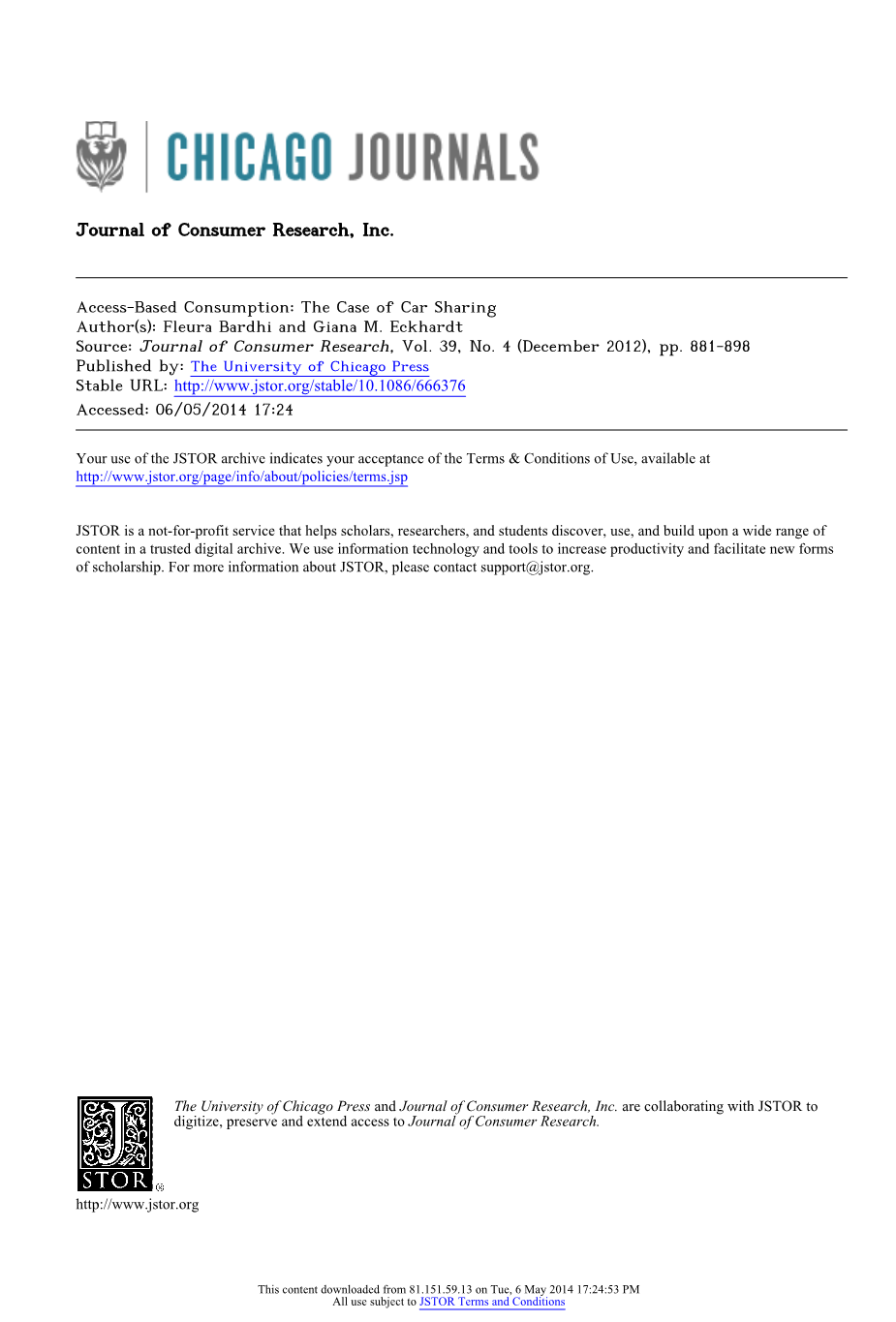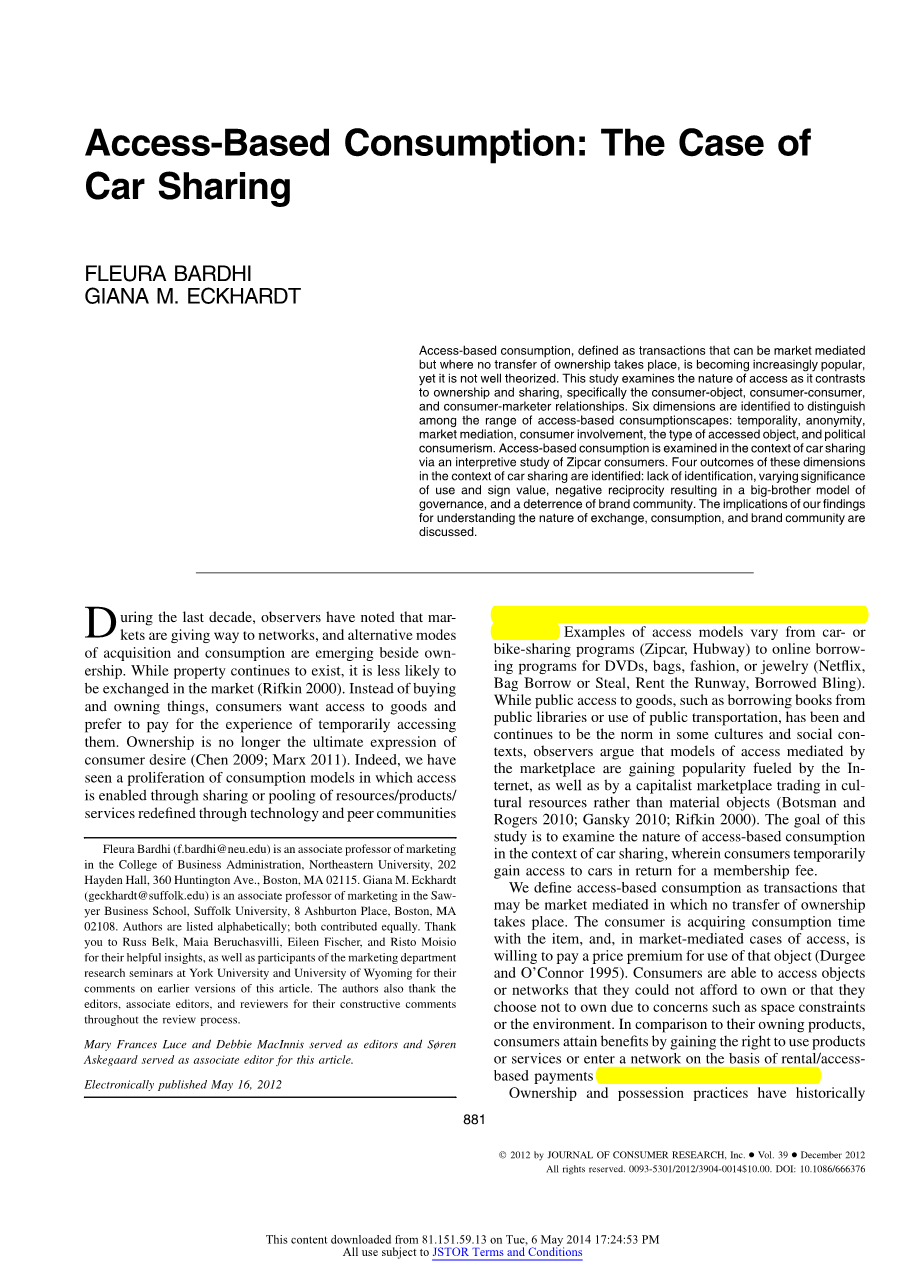

英语原文共 19 页,剩余内容已隐藏,支付完成后下载完整资料
外文翻译
During the last decade, observers have noted that markets are giving way to networks, and alternative modes of acquisition and consumption are emerging beside ownership. While property continues to exist, it is less likely to be exchanged in the market (Rifkin 2000). Instead of buying and owning things, consumers want access to goods and prefer to pay for the experience of temporarily accessing them. Ownership is no longer the ultimate expression of consumer desire (Chen 2009; Marx 2011). Indeed, we have seen a proliferation of consumption models in which access is enabled through sharing or pooling of resources/products services redefined through technology and peer communities(Belk 2010; Botsman and Rogers 2010; Gansky 2010; Giesler 2006).
在过去的十年中,观察家们注意到,市场正在给网络让路,除所有权之外,替代模式的收购和消费正在出现。虽则其属性继续存在,它是不可能在市场上交换(Rifkin 2000)。消费者不想购买和拥有物品,而是希望获得商品,并且愿意支付暂时体验它们的费用。所有权不再是消费者欲望的终极表达(陈2009;马克思2011)。事实上,我们看到了大量的消费模型,是通过通过技术和对等社区针对共享或汇集资源/产品服务,进行重新定义。(贝尔克2010;Botsman和罗杰斯2010;Gansky 2010;吉斯勒2006)。
Examples of access models vary from car or bike-sharing programs (Zipcar, Hubway) to online borrowing programs for DVDs, bags, fashion, or jewelry (Netflix,Bag Borrow or Steal, Rent the Runway, Borrowed Bling).While public access to goods, such as borrowing books from public libraries or use of public transportation, has been and continues to be the norm in some cultures and social contexts, observers argue that models of access mediated by the marketplace are gaining popularity fueled by the Internet, as well as by a capitalist marketplace trading in cultural resources rather than material objects (Botsman and Rogers 2010; Gansky 2010; Rifkin 2000). The goal of this study is to examine the nature of access-based consumption in the context of car sharing, where in consumers temporarily gain access to cars in return for a membership fee.
访问模型的例子从汽车或自行车共享项目(Zipcar美国网上租车公司,Hubway波士顿自行车共享项目)到在线借用 dvd、箱包、时装或珠宝首饰的程序(netfilx,或偷或借的包,租跑道,借珠宝)。公众获取物品, 例如借用公共图书馆的书籍或使用公共交通工具, 在一些文化和社会环境中, 一直并且持续是常态,观察家认为,由市场介导的接入模式越来越受到互联网的刺激,同时资本主义市场的交易越来越受文化资源驱动而非实物物质对象驱动。(Botsman、罗杰斯Gansky 2010;2010;金2000)。本研究的目的是探讨在汽车共享的背景下,基于消费的性质,消费者能够通过缴纳会员费暂时地使用一辆车。
We define access-based consumption as transactions that may be market mediated in which no transfer of ownership takes place. The consumer is acquiring consumption time with the item, and, in market-mediated cases of access, is willing to pay a price premium for use of that object (Durgee and Orsquo;Connor 1995). Consumers are able to access objects or networks that they could not afford to own or that they choose not to own due to concerns such as space constraints or the environment. In comparison to their owning products,consumers attain benefits by gaining the right to use products or services or enter a network on the basis of rental/access based payments (Lovelock and Gummesson 2004).
我们定义基于访问的消费是以市场为介质,所有权没有转移的发生的。消费者在市场为介质的情况下得到项目的消费时间,并愿意为使用对象支付额外的费用(durgee和奥康纳1995)。消费者能够接触的他们负担不起的对象或网络,或者由于空间限制或环境问题,他们不能拥有或他们选择不拥有。如:与他们拥有的产品相比, 消费者通过获得使用产品或服务的权利或在基于租赁/访问的付款的基础上进入网络, 从而得到利益(洛夫洛克和甘梅森2004)。
Ownership and possession practices have historically been of central interest to consumer researchers. Research in alternative modes of consumption apart from ownership is limited, with pioneering studies including Belkrsquo;s conceptual outline of sharing and Chenrsquo;s empirical study of experiential access to art via museums and galleries. This research stream has demonstrated that the mode of consumption shapes consumersrsquo; relationship to products and services and their preferences, values, and desires. For example, Chen (2009) points out the contrast between art collectors and visitors to art museums and suggests that mode of consumption shapes consumersrsquo; perception of value. She also finds that each mode of consumption is underlined by distinct consumer desires. Moeller and Wittkowski (2010) find different consumer preferences associated with possession versus access in a peer-to-peer-sharing online network. Further, Chen (2009) and Rifkin (2000) propose that access produces a different object-self relationship compared to ownership. While the phenomenon of access-based consumption has been noted in the literature,we lack an understanding of what the nature of consumption under conditions of access looks like. In this study, we advance our understanding of access through the study of one market-mediated type: car sharing.
这项研究流表明,消费模式塑造消费者的产品和服务的关系和他们的喜好,价值观和欲望。例如,陈(2009)指出艺术收藏家和艺术博物馆的参观者之间的对比,并认为消费模式塑造消费者的价值观。她还发现, 每种消费模式都是由不同的消费者欲望所强调的。默勒和维特克维斯基(2010)在对等群体社区共享的在线网络中找到了与占有与访问相关的不同的消费者偏好。此外,陈(2009)和里夫金(2000)提出,与所有权相比,接触能够提供不同的对象关系。虽然在文献中已经注意到了基于接入的消费现象, 但我们对在接触访问条件下消费的本质缺乏了解。在这项研究中, 我们通过研究一个市场介导的类型: 汽车共享, 以促进我们对接触访问的理解。所有权和占有行为历来是消费者研究者的核心兴趣。除了所有权之外, 其他消费模式的具有开创性的研究研究还是有限的, 包括贝尔克的共享的概念大纲, 以及陈氏通过博物馆和画廊体验到艺术的经验研究。
We provide a systematic theoretical development that integrates and extends prior work on shared resources and that compares and contrasts access systematically with modes already represented in the literature, namely, owning and sharing. We then undertake an analytical investigation into the phenomenon of access, by examining why consumers engage in car sharing; what are the processes involved; and what are the implications for consumer-object, consumer-consumer, and consumer-firm relationships. Our contribution lies in conceptualizing access-based consumption, identifying the dimensions on which various types of access consumptionscapes differ from one another, and going on to introduce the outcomes of these dimensions in the context of car sharing. In this way we advance our limited understanding of this alternative mode of consumption. Mapping a construct and its implications is deemed an especially valued and relevant theoretical contribution in the study of em
全文共121377字,剩余内容已隐藏,支付完成后下载完整资料
资料编号:[145338],资料为PDF文档或Word文档,PDF文档可免费转换为Word
以上是毕业论文外文翻译,课题毕业论文、任务书、文献综述、开题报告、程序设计、图纸设计等资料可联系客服协助查找。


